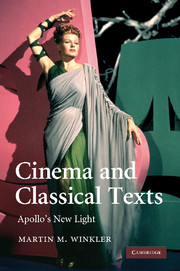Book contents
- Frontmatter
- Contents
- List of illustrations
- Acknowledgments
- ΦΟΙΒΩΙ ΑΠΟΛΛΩΝΙ ΦΩΤΟΚΙΝΗΤΗΙ
- Introduction: The god of light and the cinema eye
- 1 A certain tendency in classical philology
- 2 Divine epiphanies: Apollo and the Muses
- 3 The complexities of Oedipus
- 4 Patriotism and war: “Sweet and fitting it is to die for one's country”
- 5 Helen of Troy: Marriage and adultery according to Hollywood
- 6 Women in love
- Epilogue: “Bright shines the light”
- Bibliography
- Index
3 - The complexities of Oedipus
Published online by Cambridge University Press: 18 August 2009
- Frontmatter
- Contents
- List of illustrations
- Acknowledgments
- ΦΟΙΒΩΙ ΑΠΟΛΛΩΝΙ ΦΩΤΟΚΙΝΗΤΗΙ
- Introduction: The god of light and the cinema eye
- 1 A certain tendency in classical philology
- 2 Divine epiphanies: Apollo and the Muses
- 3 The complexities of Oedipus
- 4 Patriotism and war: “Sweet and fitting it is to die for one's country”
- 5 Helen of Troy: Marriage and adultery according to Hollywood
- 6 Women in love
- Epilogue: “Bright shines the light”
- Bibliography
- Index
Summary
“The Greatest Love Story of All Time!” Anybody who comes across this tagline is likely to think of Antony and Cleopatra, Romeo and Juliet, Tristan and Isolde, or some other pair of famous lovers, but an anonymous hack writing ad copy for a film about Oedipus was thinking along different lines. The single greatest impulse for Oedipus' prominence in Western culture since antiquity came with Sophocles' play Oedipus the King (or Oedipus Rex). The story of Oedipus, if not primarily as a love story, has been a staple of cinema since 1908, when André Calmette directed an Oedipe roi in France. He was followed by Giuseppe de Liguoro in Italy with Edipo re (1909 or 1910). Two more versions appeared shortly afterwards: Oedipus Rex (1911) by Theo Frenkel, who also played the part of Oedipus, and Oedipus Rex (1912) by Theo Bouwmeester. La légende d'Oedipe by Gaston Roudès came in 1913. Since then, Oedipus has remained an enduring presence on screen.
Filmic retellings of the Oedipus story and of related themes such as parricide, incest, and the power of fate are too numerous and varied to be dealt with in their entirety. Instead, I will attempt to demonstrate their wide range by adducing and commenting on instances that, taken together, reveal their versatility and adaptability. I omit such cases as the Italian mystery Oedipus Orca (1976) by Eriprando Visconti (nephew of Luchino), the Japanese Oedipus no yaiba (1986; roughly, “Oedipus' Sword”) by Toichiro Narushima, the American Exploding Oedipus (2001) by Mark Lafia, a modern story, and the French L'origine du monde (“The Origin of the World,” 2001; it has a Sphinx character) by Jérôme Enrico.
- Type
- Chapter
- Information
- Cinema and Classical TextsApollo's New Light, pp. 122 - 153Publisher: Cambridge University PressPrint publication year: 2009
- 5
- Cited by



